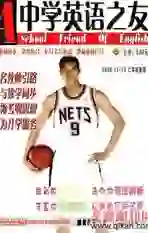解读一般现在时
2008-12-08孔敏
孔 敏
一般现在时是中考热点,同时也是七年级上学期的一个重要语法项目,现在谈谈一般现在时,以便帮助大家更好地掌握这一语法项目。
一、概念
一般现在时表示现在的一段时间内经常发生的动作或存在的状态。如:
You are students. 你们都是学生。
We often practice English in the morning. 我们经常在早晨练习英语。
二、判断依据
一般现在时常有often,usually,always,sometimes等频度副词或表示经常性的时间状语如every day/week/month/year,on Sundays等。如:
They usually watch TV in the evening. 他们通常晚上看电视。
My father goes to work by bike every day.
我的父亲每天骑自行车去上班。
His mother often goes shopping on Sundays.
他的妈妈经常星期日去购物。
三、句子谓语
1.含系动词be(am/is/are)。be动词的用法为:I 作主语,用am,you作主语用are,单数的人或物以及不可数名词作主语用is,两个或两个以上的人或物作主语,用are。如:
I am a student. 我是一个学生。
Are you a musician? 你是一个音乐人吗?
He is a businessman. 他是一个生意人。
My brother and sister are both students. 我的哥哥和姐姐都是学生。
Two cups are on the table. 两个茶杯在桌子上。
2.含can,may,must,need等情态动词的一般现在时的句子,它们没有人称和数的变化,后接动词原形,如:
He can swim. 他会游泳。
They can dance and sing. 他们既会唱歌又会跳舞。
3.含行为动词(即实义动词)的一般现在时的句子,根据句子主语的不同而使用不同的动词形式:
(1)第三人称单数主语作句子主语具体指下列情况: a.人称代词he, she, it。b.单个人名、地名或称呼。c.单数可数名词或“this/that/the/形容词性物主代词+单数可数名词”。d.不定代词someone, somebody, nobody, everything, something, one等,及指示代词this, that。e.不可数名词。f.数字、重量、算式、时间、距离或字母等。如果是这些第三人称单数作句子主语,谓语用单三动词,单三动词的构成与名词的单数变为复数的规则基本相同,主要掌握:一般情况在动词末尾加s。如closes、starts等;以s、x、sh、ch、o结尾的动词在词尾加es。如:does、washes、watches等。以“辅音+y”结尾的动词,先将y改为i,再加es,如studies、carries等,have的单三形式为has,如:
He does his homework in the evening. 他在晚上做作业。
She has a brother. 她有一个哥哥。
My mother often goes shopping on Sundays.
我妈妈经常星期天去购物。
(2)如果不是第三人称单数作句子主语,谓语用动词原形。如:
I have an English dictionary. 我有一本英语词典。
They like playing basketball. 他们都喜欢打篮球。
You have a football. 你有一个足球。
四、句式
(一)陈述句形式常有五种:
1.“S+V”(主语+不及物动词)。如:
My mother gets up early every morning. 妈妈每天早晨起床很早。
The sun rises in the east. 太阳从东方升起。
2.“S+V+P”(主语+系动词+表语)。如:
His sister is a teacher. 他的姐姐是一名教师。
I feel very happy. 我感到非常高兴。
3.“S+V+O”(主语+及物动词+宾语)。如:
She is reading a book. 她在看书。
They made cakes. 他们做了蛋糕。
4.“S+V+InO+DO”(主语+及物动词+间接宾语+直接宾语)。如:
He gives me a piece of paper. 他给我一张纸。
She tells me a story. 她给我讲了一个故事。
5.“S+V+O+C”(主语+及物动词+宾语+宾语补足语)。如:
We must keep our school clean. 我们必须让学校保持干净。
㈡疑问句
1.一般疑问句
在朗读时要用升调,一般都能用yes或no进行回答。由陈述句变一般疑问句的方法有:
(1) 谓语动词有be动词(am/is/are)或情态动词(can,must,could,would等),把它们提到主语前(即跟主语位置对调),可用口诀“一调、二改、三变”来概括这种方法,“一调”指把句中的be(am/is/are)或can等词调到主语前;“二改”指句中的主语若含有I(my/we)等第一人称代词时,需将它们分别改为you(your/you),谓语为am时,常改为are;“三变”指把句末的句号变为问号,如:
My brother is a teacher.(改疑问句) Is your brother a teacher?
She can dance and sing.(改疑问句) Can she dance and sing?
I am a student. (改疑问句) Are you a student?
(2)句中没有am/is/are/can/must等系动词或情态动词时,如果谓语是动词原形,变一般疑问句时要在其句首加助动词do,如果是单三动词在句首加助动词does,并把单三动词改成原形。可用口诀“一加助、二改原、三变号”来概括这种方法,“一加助”指第一步根据谓语动词加助动词do或does,“二改原”指用了助动词does后,要把单三动词改为原形(加助动词do时,因原句已经就是动词原形,所以动词不需要变动),“三变号”指第三步把句末的句号变为问号,如:
He studies English.(改疑问句)→Does he study English?
They have a good teacher.(改疑问句)→Do they have a good teacher?
2.特殊疑问句
变特殊疑问句,在一般疑问句前加相应的特殊疑问词,回答往往针对特殊疑问词进行。如:
——Where do they work? 他们在哪里工作?
——They work in a factory. 在工厂。
——What does she do? 她是干什么的?
——She is a teacher. 她是个老师。
——How much are these pants? 这些裤子多少钱?
——They are twelve dollars. 他们12美元。
——When is your birthday? 你的生日是什么时候?
——Its June 3rd. 6月3日。
3.选择疑问句
选择疑问句以特殊疑问句或一般疑问句的相关人、物、时间、地点等为基础,以or连接另一个(或多个)人、物、时间、地点等供选择,回答时往往选择or前或后的部分进行回答,如:
——Is your friend a boy or a girl? 你的朋友是男孩还是女孩?
——A boy. 男孩。
——Does she work in a factory or in a shop?
他在工厂还是在商店工作?
——In a shop. 在商店。
(三)否定句
(1)有am/is/are或can/must/could/would等直接在它们后加not,如:
They are at home today. (否定句)→They arent at home today.
He is at work. (否定句)→He isnt at work.
She can dance well. (否定句) →She cant dance well.
(2)没有系动词或情态动词则加dont/does not构成否定句,如原句是单三动词的要改为原形,如:
He studies English. (否定句)→He doesnt study English.
They have a good teacher. (否定句)→They dont have a good teacher.
注意:
(1)I think…句型变否定句时要以think为中心,如:
I think it is right. 我认为它对。
I dont think it is right. 我认为它不对。
I think she is at home. 我认为她在家。
I dont think she is at home. 我认为她不在家。
(2)因no=not any/a,所以不少名词前也常有no构成否定的(尤其是在there be或have/has句式中)。如:
I have time to do the housework. 我有时间干家务活。
I have no time(=not any time) to do the housework.
我没时间干家务活。
There is a book in my backpack. 我的双肩背包里有一本书。
There is no book in my backpack. 我的双肩背包里没有书。
(3)肯定句含有always, sometimes, often, usually等时,常把它们改为never变为否定句。如:
He always does some reading at the weekend. 他在周末经常阅读。
He never does some reading at the weekend. 他在周末从不阅读。
My sister often goes to school by bus.
我妹妹经常乘公共汽车去上学。
My sister never goes to school by bus.
我妹妹从不乘公共汽车去上学。
(4)have/has作“有”讲时,变疑问句或否定句有两种方式,既可借助于助动词do/does,也可用它们本身,have/has作其它意义时,只能借助于助动词。如:
He has a pen. 他有一支笔。
Does he have a pen?/Has he a pen? 他有一支笔吗?
He doesnt have/hasnt a pen.他没有一支笔。
They have lunch at school. 他们在学校里吃午餐。
Do they have lunch at school? 他们在学校里吃午餐吗?
They dont have lunch at school. 他们不在学校里吃午餐。
(5)在变否定句或疑问句时,一般要把some改成any。如:
She wants some chalk.(否定句)→She doesnt want any chalk.
There are some beautiful flowers for them.(疑问句)→Are there any beautiful flowers for them?
练习:
一、用动词的正确形式填空
1. We often ____(play) football after school.
2. He ____(get) up at six oclock.
3. What ____ your sister usually ____(do) after school?
4. Helen____ (study) English, Chinese, Maths, Science and Art at school.
5. Bob sometimes ____(go) to the park with his sister.
6. Her brother ____(watch) TV with her parents every night.
7. ____ Cindy ____(read) English every morning?
8. How many lessons ____ your brothers ____(have) on Monday?
9. Her sister ____(have) a tennis racket.
10. What time ____ you ____(go) to school?
二、句型转换
1. I have a soccer ball.(改为否定句)
2. Graces sister likes playing table tennis. (改为否定句)
3. Mike has two letters for him. (改为一般疑问句)
4. I always play football on Friday afternoon. (改为否定句)
5. Su Yang usually washes some clothes on Saturday.(对划线部分提问)
6. I can see some kites in the sky. (改为一般疑问句)
7. There are some men near the river. (改为否定句)
8. I like actions and comedies. (对划线部分提问)
9. They want to go to a movie. (改为一般疑问句)
10. Jane watches sports on TV. (改为一般疑问句)
Keys:一、1.play 2.gets 3.does; do 4.studies 5.goes 6.watches 7.Does; read 8.do; have 9.has 10.do; go二、1.I dont have a soccer ball./I havent a soccer ball. 2.Graces sister doesnt like playing table tennis. 3.Does Mike have two letters for him?/Has Mike two letters for him? 4.I never play football on Friday afternoon./I dont always play football on Friday afternoon. 5.What does Su Yang usually do on Saturday?6.Can you see any kites in the sky? 7.There arent any men near the river. 8.What kind of movies do you like? 9.Do they want to go to a movie? 10.Does Jane watch sports on TV?
